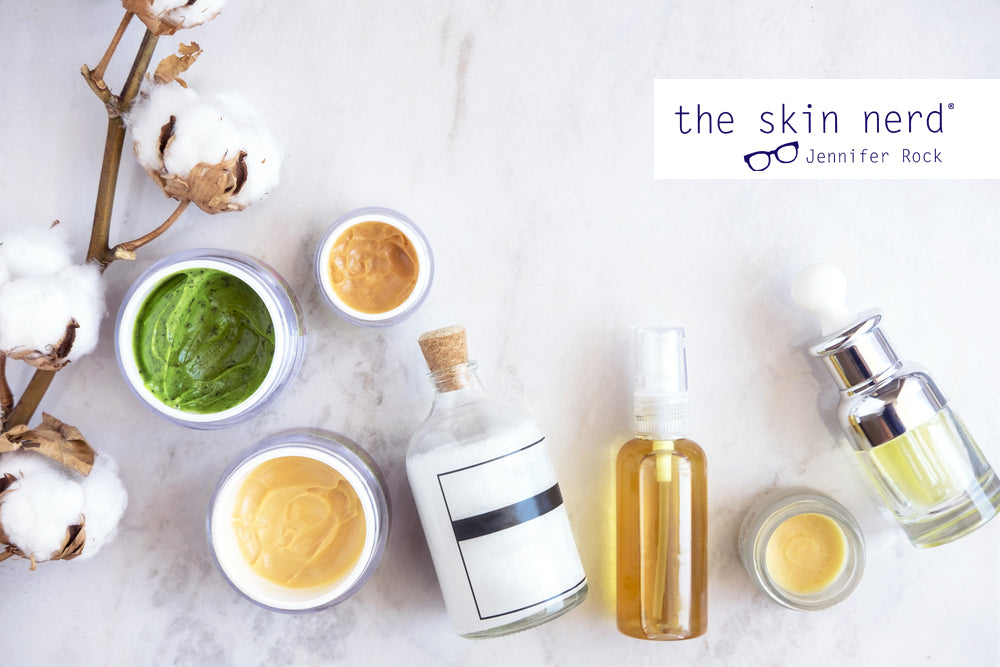
Plant-Based Skincare Alternatives & Why To Use Them
When we think of plant-based skincare, we often think of natural skincare. However, there is a distinction to be made between plant derivative ingredients and skincare that is made from plants.
With the growth in all-natural, “clean” skincare, free from preservatives, all forms of alcohol and chemicals, even highly-beneficial ones, cosmeceutical and results-driven cosmetic skincare brands are taking the best bits of plants and botanicals and making them do things that we wouldn’t have dreamt of a decade ago.
With this in mind, it can be tempting to opt for a route that seems like it may be more beneficial to the skin, but how do these retinol, chemical exfoliant and sheet mask alternative measure up to their “more chemical” or “less natural” counterparts?
Chemicals in skincare
Before we continue with the super juicy nerdie comparison, I must remind you of my opinion when it comes to chemicals in skincare and the scaremongering that surrounds them. Everything is a chemical. Often, the difference between a naturally-existing chemical and a chemical that has been formulated or altered in a lab with the skin in mind is that the formulated chemical will be more effective.
Certain ingredients need to be a specific molecular size or delivered to the skin in a particular way to live up to their promises (case in point, vitamin C). If we apply orange juice to our face, we don’t expect skin results. In the same vein, why would we expect skin results from a formulation that isn’t geared towards actually getting to the skin?
Plant-based skincare derivatives: how they compare
Plant-based retinol alternatives vs. other forms of Vitamin A (retinyl palmitate, retinol)
Vitamin A is my all-time favourite skincare ingredient and I believe that everyone should be using it in their skincare regime (unless you currently have a mini hooman growing within you). It is essential for all cellular processes within the skin, ensuring that there is no sluggish cell division which in turn leads to problems with our skin’s own exfoliation process.
Now, we’re seeing the rise of the plant-based retinol and retinoid alternatives, meaning ingredients that behave like true retinoids (vitamin A derivatives) but are not a form of vitamin A. A big player in this game is bakuchiol, an extract taken from the seeds of psoralea corylifolia plant, and is technically termed a “phytochemical”.
In a study, bakuchiol appeared to be able to tackle the signs of ageing in much a similar way to retinol, especially with regard to pigmentation and redness. Notably, the key benefit of bakuchiol versus retinol and retinoids is how tolerable it is even for incredibly reactive skins.
You’ll find bakuchiol in REN’s Bio Retinoid Anti-Wrinkle Cream (€50.00) and Bio Retinoid Anti-Wrinkle Concentrate Oil (€50.00).

Another “bio-retinoid” on the rise is blue-green algae. Although the retinol-like effects of blue green algae appear to be not studied to the same extent as bakuchiol (we couldn’t find any studies), it is purported to diminish wrinkles and hydrate the skin.
It is included in one of my favourite overnight masks at the moment, the IMAGE Vital C Hydrating Overnight Masque (€78.00).
Why to opt for bakuchiol or blue-green algae over retinol or retinoids
- You have skin that is too sensitive for even low-doses of retinoids (Environ Skin EssentiA AVST Gel, AVST 1)
- You’re already using vitamin A but want to boost your results
Fruit-derived enzymes vs. acids
Although glycolic acid, lactic acid, salicylic acid and citric acid can all be found in nature (sugar cane, milk and within bones, willow bark, and citrus fruits, respectively) and may be derived from them, many still search for options that are closer to the original ingredient.
This is where exfoliants directly from fruit and fruit extracts come in. Enzymes are very popular when it comes to this. You know when you accidentally eat too much pineapple and your tongue is stingy? This is due to the enzyme within it, bromelain, which breaks down the protective proteins in your mouth.
In the same way, enzymes help to dissolve the “glue” that may prevent dead skin cells from sloughing off on their own. The enzymes you will most commonly see in skincare are papain (from papaya) and bromelain (the aforementioned pineapple enzyme) such as in the IMAGE Vital C Hydrating Enzyme Masque (€42.00 on the Nerd Network store).

You’ll also find papaya enzymes in Caudalie’s Glycolic Peel Mask (€28.00, available to all on The Skin Nerd store), alongside glycolic acid and hydrating glycerin. Since enzymes are gentle and only “eat” dead skin cells, the risk of over-exfoliation is smaller than with glycolic acid, lactic acid and salicylic acid.
Why to opt for enzymes over acids like glycolic, lactic and salicylic
- You have super sensitive skin yet want to chemically exfoliate
- You have an allergy to acids
- You are pregnant (salicylic acid is not advised during pregnancy, and lactic acid and glycolic acid can cause irritation with some whilst they are pregnant)
Plant pulp, gel and bio-cellulose sheet masks vs. paper or fibre sheet masks
Sheet masks only came into our lives a few years ago and now they are the staple of many skincare regimes and with this popularity comes innovation. We’re seeing more and more sheet masks made from plant pulps or plant-based gels rather than the traditional paper or fibre sheet masks and the big question is whether they actually have a benefit.
Why to use gel or bio-cellulose sheet masks instead of paper or fibre sheet masks
The actual sheet part of the sheet mask is there to serve the purpose of occlusion, ie. sealing those delicious active ingredients onto the skin to allow maximum penetration and minimum evaporation. Fibre and pulp masks don’t stick or cling to the skin as well as other forms of sheet masks and evaporation does occur when it comes to these forms.
Hydro-gel masks, on the other hand, have better powers of occlusion than pulp or fibre masks. IMAGE I-Mask Biomolecular Anti-Aging Radiance Mask (€11.50) uses a hydro-gel derived from red algae and carob tree for better performance but it must be handled a little more carefully than the typical sheet mask. The crème de la crème are bio-cellulose sheet masks, often made from bamboo or coconut.
They do not dry out, they can adhere to the contours of the skin closely for optimum ingredient penetration and they are often biodegradable.  If you’ve ever asked yourself why you’d pay over a tenner for a sheet mask, this is why. It’s essentially guaranteed to be more effective than a much cheaper pulp one. We adore the Seoulista Instant Facials which use coconut-based, biodegradable bio-cellulose. Each comes in at a reasonable €9 and you can shop the entire range on The Skin Nerd store.
If you’ve ever asked yourself why you’d pay over a tenner for a sheet mask, this is why. It’s essentially guaranteed to be more effective than a much cheaper pulp one. We adore the Seoulista Instant Facials which use coconut-based, biodegradable bio-cellulose. Each comes in at a reasonable €9 and you can shop the entire range on The Skin Nerd store.
